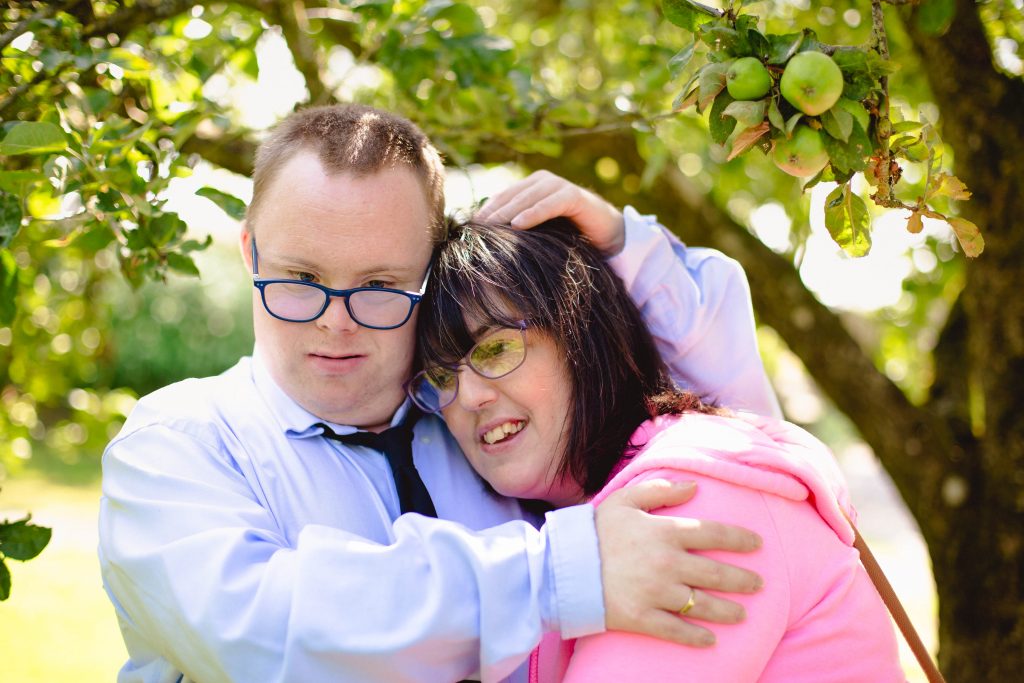Mencap Cymru’s oral history project captures the importance of connections and relationships for people with a learning disability – and outlines where things are failing.
This article follows up from Rethinking Wales: Re-defining Community and Connections which is also available to listen as a podcast.
Between 2017-2020, the Our Social Networks project, funded by the National Lottery Heritage Fund, collected stories from people with a learning disability about their friendships and relationships.
We recorded 40 oral history interviews with over 60 people. Unsurprisingly, the stories shared through this project confirm the role of friendships and relationships in securing a good life.
We know from existing research that having connections and friendships improves our happiness and our health.
The stories we collected illustrate the importance of having a shared history with another person, our need for companionship and the role friends play in helping us to make sense of who we are and our experiences.
For many people with a learning disability friendships and relationships create a sense of validation and pride.
“I was bullied horrendously to the point that I actually missed a lot of school.”
It is important to have people beyond immediate family who value you and choose to spend time with you.
Yet the stories also expose how elusive friendships and intimate relationships continue to be for many people with a learning disability. Often social networks seemed to revolve exclusively around family and/or staff.
Many of the stories analysed referenced some experience of bullying.
“Oh, horrendous for me: horrendous to make friends. I didn’t have any friends at school, I was the one that no-one wanted to be friends with …why I don’t know but nobody ever, ever….I was bullied horrendously to the point that I actually missed a lot of school.”
This experience seemed to have had an on-going impact on people’s identity, self-worth and capacity to trust others.
Many people spoke of not feeling accepted or safe in mainstream environments and only finding the safety to be themselves and form friendships at learning disability specific groups.
In this context, it is important for professionals to scrutinise our intentions around inclusion and to recognise the cost for some in pursuing this approach at the expense of alternative options.
The stories also reinforce the need for a holistic approach to Relationship and Sexuality Education.
One that is focused on fostering a sense of identity and self-worth as a foundation for forming connections with others.
A key theme from the stories, both covertly and overtly, was the number of people with a learning disability who had limited control over their lives and particularly the decisions that impact their friendships and relationships.
“It wasn’t unusual for people who had been in a relationship for many years to only see each other at organised groups once or twice a week.”
The stories exposed a power imbalance that permits staff and family members to prioritise protection and safeguarding at the expense of autonomy and agency.
The compulsion to protect, often coming from a place of love and regard, diminished opportunities for connection.
The overwhelming message for both professionals and families from these stories, is the very real need for facilitation.
People with a learning disability require staff and families to play a proactive role in securing and nurturing friendships, especially intimate relationships.
There is a need to approach friendships and relationships with the dedication that we would invest in facilitating travel training or paid employment.
Robust debate and agenda-setting research.
Support Wales’ leading independent think tank.
We know from the stories that proactive support offered by social care faces many practical barriers.
Resources are limited and staff aren’t available to support people to meet friends and partners on their terms:
S: Saturday I want to be with my babe, so I want to be with my babe Saturday night not Friday night.
Interviewer: And why don’t you meet up on a Saturday night?
S: Well, I can’t see him it’s always too busy.
Interviewer: You’re not allowed to see him?
S: Staff said no…
Interviewer: And why do the staff say no?
S: Because there’s no staff on.
It wasn’t unusual for people who had been in a relationship for many years to only see each other at organised groups once or twice a week.
On top of the scarcity of staff, there were often structural barriers within social care that were driven from a safeguarding perspective with limited exploration of the consequence on people’s rights.
Yet the issue of power is much more pervasive than this. Framing the issue around limited resources or structural barriers within social care doesn’t capture the depth of the challenge.
Nor does it acknowledge that many of the participants who shared their stories were not in formal support but were often living with family or living independently.
“As long as the relationship don’t interfere with the support of one-to-one it don’t matter.”
The stories showed time and again that people with a learning disability had learnt to delegate decisions to the people around them.
Permission or approval was sought for a whole range of tasks and decisions.
Interviewer: How long do you think it will be before you get married, do you think?
Answer: Not sure. If X’s mum is happy if we can get married or not. Because it’s up to our parents to decide.
We know that we are all interdependent and that dependency on others is indicative of connection and resilience.
We are all influenced by those around us, consciously or not, but the scope and scale of influence imposed on people with a learning disability suggests a more significant challenge.
“The temptation within social care may be to view friendships and relationships as an added extra.”
The stories expose the lack of practice and trust people with a learning disability often have in contributing to decisions around their own life.
Whilst the project has identified a series of pragmatic recommendations to prioritise friendships and relationships within social care, it seems clear that this is a challenge that extends beyond formal support structures; families, education and the wider community have a role to play.
How do we support people with learning disability, from a young age, to trust they have a contribution to make to the decisions that affect their lives?
The temptation within social care may be to view friendships and relationships as an added extra.
Interviewer: How have your friends reacted to your relationship? …And what about support staff or you mentioned your Social Worker before?
J: Yeah, um they’re alright about it but they did say as long as…as long as the relationship don’t interfere with the support of one-to-one it don’t matter.
Yet, if we are really interested in the business of addressing health inequity or improving wellbeing, we can’t afford NOT to consider connections and relationships.
Find out more about Mencap’s storytelling here.
All articles published on the welsh agenda are subject to IWA’s disclaimer.





